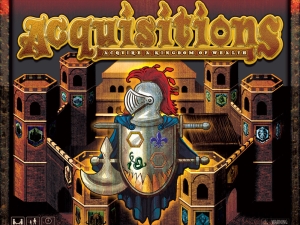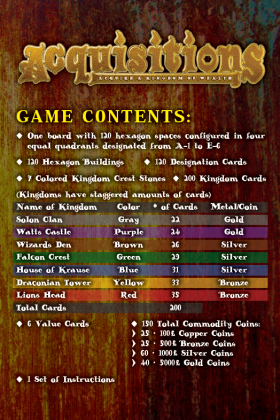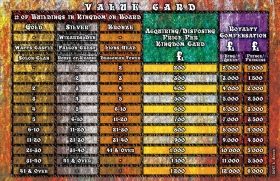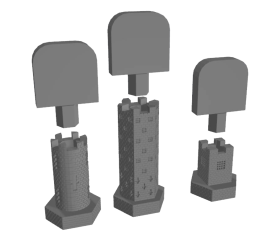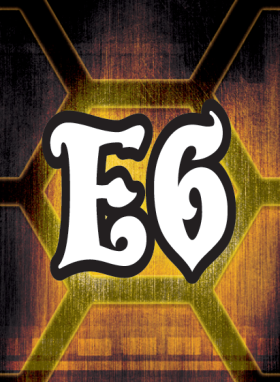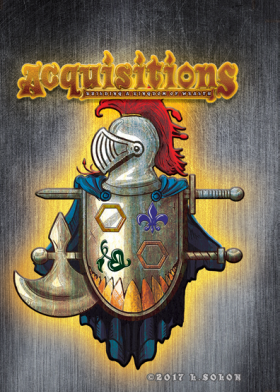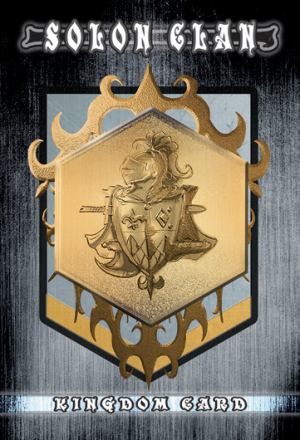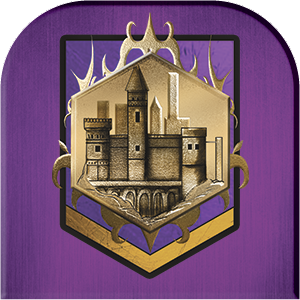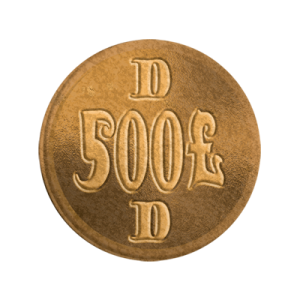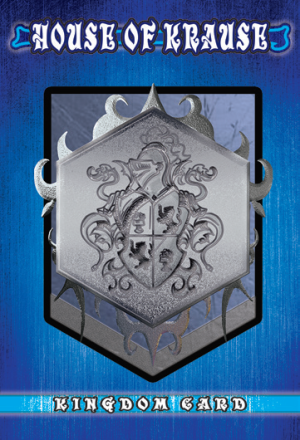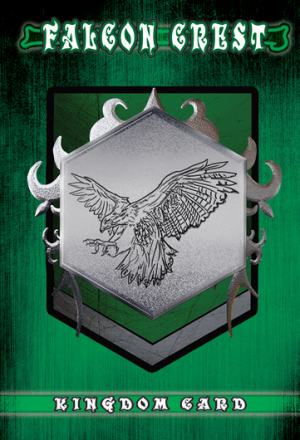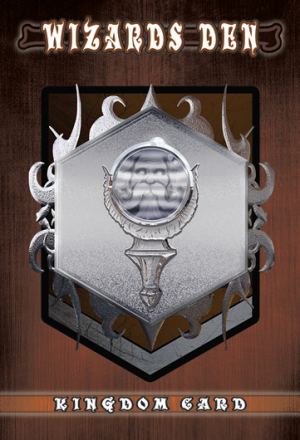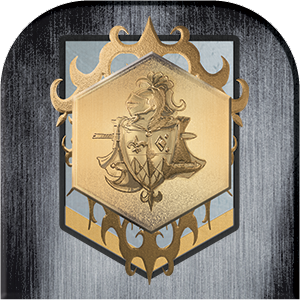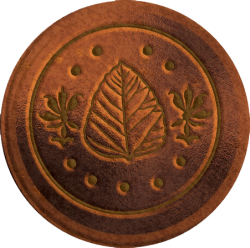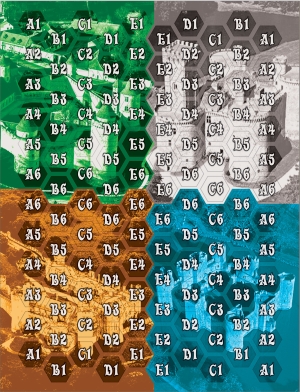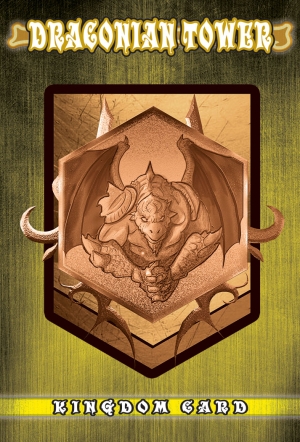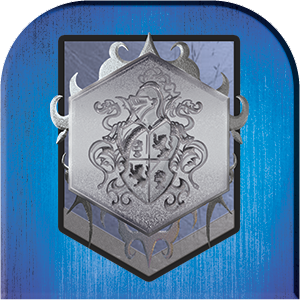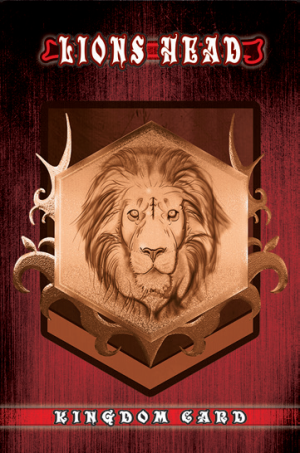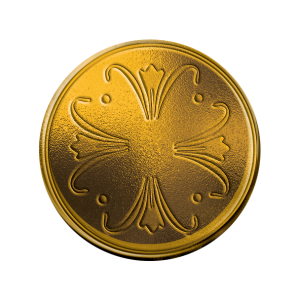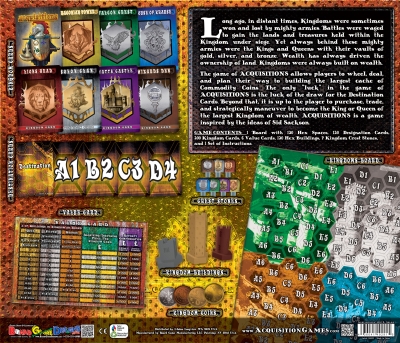| Game contents: One board with 120 hexagon destinations configured in four equal quadrants designated from A-1 to E-6 120 Hexagon Castles 120 Destination Cards 7 Colored Kingdom Crest Stones 200 Kingdom Cards (Kingdoms have staggered amounts of cards) 6 Value Cards 150 total Commodity Coins: 25 - 100£ Copper Coins 25 - 500£ Bronze Coins 60 - 1000£ Silver Coins 40 - 5000£ Gold Coins 1 set of instructions |
The basic concept of the game of ACQUISITIONS is that the players create and grow Kingdoms by playing the Destination Cards in their hand and placing castles on the board. The Destination Cards available to the player are provided strictly by the luck of the draw. The skill in the game of ACQUISITIONS, to generate a large amount of Commodity Coins, comes from the ability to obtain Kingdom Cards in the Kingdoms that will grow or even in the Kingdoms that are taken over by larger Kingdoms.
The purchase of Kingdom Cards is generally made in Kingdoms based on the player's capability to grow those Kingdoms with their Destination Cards on hand. However, players can increase their Commodity Coins by obtaining Kingdom Cards in Kingdoms that grow from the other players' placement of castles.
Goal:
The main objective of ACQUISITIONS is to become the player with the most Commodity Coins at the end of the game. This is achieved by obtaining Kingdom Cards in the Kingdoms that are growing, for a long term venture, while at the same time shrewdly investing in smaller Kingdoms that can be sacrificed in takeovers, for a short term outlay. The combination of both is utilized to gain Commodity Coins through Royalty Compensations.
The more Commodity Coins that can be generated in short term outlays, the more they can be invested in long term ventures that grow until the end of the game. The perfect balance of investments is needed to become the reigning King or Queen of ACQUISITIONS.
Setup:
Put the game board in the center of the table. Destination Cards are shuffled and placed in a central location so that all players may draw from the pile. Designate a “Commodity Coin Broker” and a “Kingdom Card Overseer” to handle distribution of Commodity Coins and Kingdom Cards (if desired).
The Commodity Coin Broker distributes 6,000£ in Commodity Coins to each player. The Commodity Coin Broker keeps the rest of the Commodity Coins in front of them in four piles.
To determine who goes first, each player draws a Destination Card from the pile. The player whose card is closest to “A-1” goes first. The progression of tiles goes A-1 thru A-6 and then B-1 thru B-6. (A-6 is closer to A-1 than B-1.)
The cards are placed back into the pile and shuffled by the player who goes first. That player then deals 6 Destination Cards to each player starting with the player to their left. All players keep their cards in front of them and concealed from the other players. The play then progresses to the left of the first player.
Turn Summary:
Play a Destination Card and then place a random castle on the game board onto its matching destination. Castles can be placed on a matching destination in any of the four quadrants on the board.
Obtaining Kingdom Cards:
Purchase or trade Kingdom Cards in any active Kingdom. No more than three individual Kingdom Cards can be purchased or obtained through trade in one turn.
Kingdom Card prices are determined as follows:
Find the name of the Kingdom on the Value Card for the Kingdom Cards that are being obtained. There are three columns of Kingdoms: Gold, Silver, and Bronze. Refer down the appropriate column to find the castle size of the Kingdom. Cross-reference the castle size of the Kingdom to the Kingdom Card Price Column for the cost per Kingdom Card.
Kingdom Cards are valued based on the metal that is mined in that particular Kingdom. Kingdoms with bronze as their metal start at 200£ apiece for their Kingdom Cards. Silver Kingdoms start at 300£ and Gold Kingdoms start at 400£. The price per card increases when castles are added to the Kingdom.
There are staggered amounts of Kingdom Cards for each Kingdom – once those cards are gone, they cannot be purchased unless Kingdom Cards are returned through disposition after takeover or through trade.
The declaration of Kingdom Card amounts held by individual players during game play must be determined before game play begins. There are four different methods that can be chosen:
1) No disclosure of Kingdom Card amounts during regular game play. (Players keep track by memory.)
2) Kingdom Card Overseer discloses Kingdom Card amounts left.
3) Players disclose Kingdom Card amounts on hand.
4) Total disclosure of Kingdom Card amounts.
Trading Kingdom Cards:
A player on their turn may trade Kingdom Cards for other Kingdom Cards ONLY if they do not have enough Commodity Coins to purchase the Kingdom Cards they want to obtain. They can only trade the amount of Kingdom Cards it takes to raise the Commodity Coins needed to obtain up to three Kingdom Cards.
If the monetary trade is not exactly even, the player is allowed to get a small amount of change. If the value of the change received is more than the value of one of the Kingdom Cards being used in the trade, then the player must keep that Kingdom Card instead of receiving Commodity Coins.
Example: If a person has Kingdom Cards in Solon Clan and the Kingdom has 3 castles, the Kingdom Cards are worth 500£ for each card traded. The person wants to purchase 3 Kingdom Cards of Lions Head that has 41 castles or 1000£ for each Kingdom Card. The person could trade 6 Kingdom Cards of Solon Clan for 3 Kingdom Cards of Lions Head.
A player can trade as many Kingdom Cards as they wish in one turn in order to raise the equal amount of capital needed to obtain three Kingdom Cards.
Finish the turn by drawing one Destination Card from the supply to replace the card that was just played. Players should always have six Destination Cards in their hand.
Game Play:
Playing a card – Depending on which Destination Card is played, and how the castle is placed on the board, one of four things can happen:
1) The castle is not adjacent to other castles and is “Kingdomless”. (The hexagon shapes of the bottom of the castles allows for connection to any castle that is adjacent in every direction.)
2)The castle is adjacent to another Kingdomless castle and so forms a Kingdom.
(If all of player’s Destination Cards would form new Kingdoms, but all Kingdoms are already on the board with none available to be formed, then the player does not play a Destination Card and does not draw a new one. The player is still allowed to obtain Kingdom Cards.)
When a Kingdom is formed, the player selects an available Kingdom Crest Stone from the tray and places it on any one of the new Kingdom's castles on the board. The player gets one free Kingdom Card for founding the Kingdom.
(If players hold all the Kingdom Cards, then the founding player gets the “founding bonus” in Commodity Coins that are equal to the Kingdom's value at time of opening.)
3) The castle is adjacent to an existing Kingdom, in which case the Kingdom grows in size by one castle and its Kingdom Card increases in value according to the Value Card.
A Kingdom that has 11 castles or more in size is “safe.”
A safe Kingdom can absorb a smaller Kingdom through takeover, but can never be absorbed itself.
A castle cannot be placed in a location that would cause two safe Kingdoms to merge. If a Destination Card cannot be played on any other hexagon destination in another quadrant, then it is placed in the discard pile and the player draws another Destination Card to replace the one discarded. A small castle is turned upside down on the hexagon destination on the board.
(If a player has a Destination Card that will cause two safe Kingdoms to merge, they may discard it immediately, whether it is their turn or not, and draw a replacement card. They must also turn over a small castle on the hexagon destination on the board.)
4) The castle is placed adjacent to two (or more) existing Kingdoms. In this case the one Kingdom takes over the other:
Count the number of castles in each Kingdom. (Do not include the connecting castle in the count for either.)
The larger Kingdom always takes over the smaller Kingdom. If connecting Kingdoms are the same size, then it is the player who instigates the takeover deciding the fate of these same size Kingdoms.
If a castle is placed that connects more than two Kingdoms, the larger one survives and the smaller ones are plundered. The same rule applies in this scenario concerning same size Kingdoms. The Kingdoms are absorbed one at a time from smallest to largest.
Remove the Kingdom Crest Stone from the conquered Kingdom(s) and return it to the Kingdom Card pile.
All players reveal how many Kingdom Cards they hold in the now defunct Kingdom. The player with the most cards is the “King” or “Queen,” while the player with the next most cards is the “Prince” or “Princess”.
The vanquished King/Queen receives the Royalty Compensation for their Kingdom that is indicated on the Value Card in the King/Queen column. Cross-reference the number of castles in the defunct Kingdom and the type of Kingdom (Gold, Silver, or Bronze). The Prince/Princess receives the Royalty Compensation indicated in the next column to the right.
If one player is the sole holder of Kingdom Cards in a Kingdom, that player gets both Royalty Compensations.
If there is a tie for King/Queen, add the King/Queen and the Prince/Princess Royalty Compensations together and divide evenly between the two players who are tied. No other players are paid. If the Royalty Compensation does not divide equally into even 100£ amounts, then the Royalty Compensation is rounded up to the next 100£ amount. If there is a tie for Prince/Princess, split the Prince/Princess Royalty Compensation indicated among those tied.
Players must now decide what to do with their defunct Kingdom Cards. Starting with the first player who is the King or Queen to the left of the merge maker, and proceeding to the next largest Kingdom Card holder, the players may:
Hold – The player can keep the Kingdom Cards from the defunct Kingdom anticipating that it will be founded again.
Sell – The player can sell their Kingdom Cards back to the Kingdom Card Overseer and Commodity Coin Broker for the current value of the Kingdom Cards directly before the takeover.
Player can use any combination of both options. (i.e. if a player has 10 Kingdom Cards, they can Sell 7 and Hold 3, etc.) The player that instigated the takeover is the only player able to acquire Kingdom Cards, as is the normal course for a turn.
Ending the Game:
The game ends when all disputed borders are resolved or when all the safe Kingdoms left on the board can no longer benefit from growth. After all disputed borders are resolved, count the castles for each Kingdom, starting with the smallest Kingdom, and include any castles that were not played that would have been within the Kingdom's border.
Players can also decide to end the game early due to time constraints. When the decision is made to end the game, all players should be in agreement, and the last player to play in the first round of the game should be the last player to play in the last round.
King/Queen and Prince/Princess Royalty Compensations are given out in the surviving active Kingdoms at the current value.
All Kingdom Cards in surviving active Kingdoms are exchanged for Commodity Coins at their current values.
The player with the most Commodity Coins is the winner.
The Game of ACQUISITIONS
There is no set formula for obtaining victory in the game of ACQUISITIONS. Becoming the King or Queen of the largest Kingdom does not assure victory. A player needs to manipulate the perfect formula of generating a working supply of Commodity Coins, while at the same time, gathering Kingdom Cards in Kingdoms that are growing. There is a lot of strategy involved in accumulating the largest amount of Commodity Coins, but there is always the luck of the draw when building a hand of Destination Cards.
The true beauty of the game of ACQUISITIONS is that every game is different. The winner is usually never determined until the end. Players must keep constant attention to the game as one exchange, one trade, or one takeover of Kingdoms can change the outcome of the game. Even keeping other players from obtaining Commodity Coins is the same as gaining Commodity Coins. The strategies are endless.
ACQUISITIONS will generally take an hour to an hour and a half to complete. Times will depend on the speed of the players to make decisions on their castle placements and which Kingdom Cards they wish to obtain. Yet no matter how long the game takes, it will always generate the excitement to play one more time.
Overview of the Game of ACQUISITIONS

